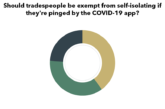
According to the Institute for Fiscal Studies, a quarter of self-employed people earning less than £50,000 a year “do not have enough liquid assets (between themselves and any partner) to cover three months’ lost earnings, and 15% do not have enough to cover a single month”.
In a briefing note, the IFS has outlined its assessment of income protection for both the self-employed and employees.
Employees
“Before the recent reforms, on average, employees would have lost 53% of their net family income if they lost their job. The reforms have reduced this to 13%. The number of employees who would have lost more than 60% of their family income if they lost their job has fallen from 9.5 million (36% of employees) to just 300,000 (1%).”
The self-employed
“Very little extra protection is afforded to self-employed workers over the next couple of months: almost half of them would see their family income fall by at least 40% if their work dried up (a figure barely affected by recent increases in universal credit). However, in June, most self-employed workers will receive a large grant – up to 80% of three months’ normal profits – if they report being affected by coronavirus at all. If the scheme is extended beyond June, a self-employed person whose business is completely shut down would have a family income thereafter around 14% lower than before the crisis, on average – similar to employees – as opposed to 44% in the absence of recent reforms…
“A quarter of self-employed people earning less than £50,000 a year do not have enough liquid assets (between themselves and any partner) to cover three months’ lost earnings, and 15% do not have enough to cover a single month…
“If self-employed workers see only a small fall in their profits, half will have a family income more than 20% above their usual level thanks to the grant. Even if their business dries up completely, a quarter will be financially better off while the self-employment grant programme continues than if the coronavirus had never struck.”
Meanwhile, The Guardian is reporting the IFS warning that two million self-employed people would not be protected because “they do not earn enough from self-employment to be eligible; earn more than the £50,000 threshold; or only started out working for themselves within the past year and therefore missing the threshold to prove their past income to receive wage subsidies.”













